The following is a guest post by Harry N. Stout, the author of the FinancialVerse books and the free newsletter Moneysavers. If you’d like to submit a guest post like this one about being financially literate or any other topic to Money Q&A, be sure to check out our guest posting guidelines.
Do you want to be better off financially and stop leaking your valuable cash? Being financially literate just might do the trick. What I have found is that a lack of financial literacy can be financially and psychologically costly. I write extensively about this in my FinancialVerse books and content (www.financialverse.com).
Despite a booming economy, record corporate profits, a healthy stock market, fifty-year low levels of unemployment, and improving wages, most people are struggling financially. They are just one missed paycheck away from financial oblivion.
My reading and research tell me the following about today’s average American family’s financial situation:
- A record number of individuals over age sixty-five are filing for bankruptcy protection.
- About 80 percent of families live paycheck to paycheck.
- Over 60 percent of families would be in a financial panic if they needed to come up with $400 to cover an unexpected bill such as a medical cost, a major car repair, a house repair, or the unexpected costs of an accident.
- Consumer debt of all types is at historically high levels, with student loan debt increasing the fastest.
- The average family has less than $100,000 saved for their retirement, which will likely last 20 to 30 year.
- The average family has less than one month of their annual cash expenses in savings.
Given today’s economic realities, the pace of technological change, and projections of what our economy will look like over the next few decades, we are rapidly moving to a point where more and more families are approaching the financial abyss. It will not take much of a push to put them over the edge.
Why are families struggling so much in favorable times? I believe the root cause is that we have not educated people about what to expect in their life’s financial journey and what financial decisions they will be called on to make. They simply do not know what to do or where to go to get the help they need.
I am not talking about the realities of the frequently mentioned 1 percent or how to become a millionaire overnight. I am talking about attaining basic financial security for the majority of Americans regardless of which identity group, race, religion, or demographic cohort they identify with or belong. The case for better education is abundantly clear from the financial distress most people are facing today. It’s time we got back to common-sense basics because we have become detached from financial reality everywhere we look.
What can not being financially literate cost you? In a February 21, 2019 article in the TheStreet.com written by Brian O’Connell, Americans are “lacking” financial literacy and that not having a grip on one’s personal finances can lead to big problems for Americans. His article was based on a recent survey from the National Financial Educator Council (NFEC).
Out of 1,500 U.S. adults NFEC surveyed, respondents said that, on average, they lost $1,230 dollars in 2018 by not properly understanding basic household finance issues – that’s about the monthly mortgage on a modest home or over two and one-half average car loan payments. Almost 20% reported not understanding their finances cost them $2,500, based on calculations provided by the NFEC. Altogether, a lack of financial literacy cost Americans a total of $295 billion in 2018.
What is financial literacy? It is defined as being educated about money and finance, with a special focus on an individual’s personal finances. Being financially literate enables you to make smarter money management decisions that lead directly to a financially secure future, one that protects the assets built by you and your loved ones.
Categories that typically come into play with financial literacy are every day financial issues like budgeting, spending, debt, taxes, retirement savings, college savings, mortgage management, and tax and estate planning.
Digging deeper, financial literacy can also include more esoteric themes, like investing, understanding how interest rates work, passive versus active income, and overall financial planning.
To achieve a reasonable level of financial literacy I suggest that you need to spend at least two hours per week improving your knowledge of personal finance. This includes viewing, reading, or listening to financial-related news and information. I know this sounds hard or maybe boring but to become financially educated, you must understand the economic environment we face, the new events impacting your money, the products and services available, and the consumer trends moving the markets.
I get my information from a variety of sources. I reach out to a selected number of websites, read a core group of print publications, and listen to a number of financial podcasts each week, including the Optimal Finance Daily.
In my book, the FinancialVerse – A Common Sense Approach for Your Money, I provide a full list of recommended sources.
Here are my last thoughts. I know you are busy living life. You have a ton of things to do. If you want to reduce the anxiety and stress that money matters can create you need to get educated. There are plenty of resources for you to tap. They are mostly free. Go for it. You may save at least $1,230 per year for your efforts.
Harry N. Stout is the author of the FinancialVerse books and free subscription Moneysavers. He can be reached at his website (www.financialverse.com).

